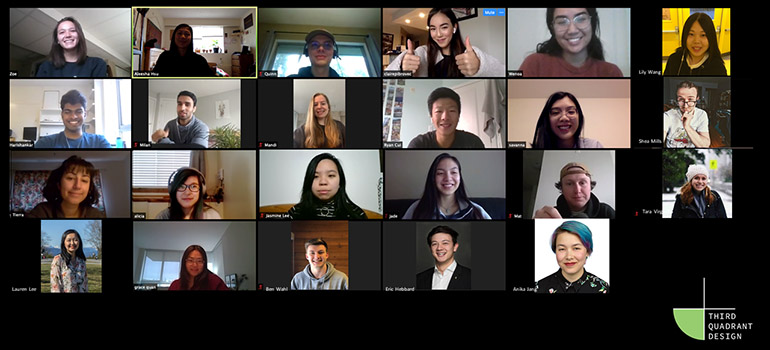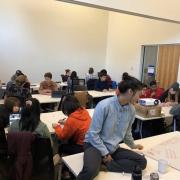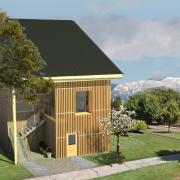
UBC Engineering student design team, Third Quadrant Design, won first place in the Urban Single-Family Division at the U.S. Department of Energy Solar Decathlon, held April 17-19, 2020.
Supervised by UBC Engineering faculty members Dr. Adam Rysanek, Dr. Sheryl Staub-French, and Dr. Susan Nesbit, Third Quadrant Design comprises of 25 UBC students across multiple engineering disciplines. It is led by three female students, Zoë Le Hong (Integrated, ’20), Aleesha Hsu (Civil, ’21), and Claire Pibrovec (Integrated, ’20), and is majority femme-identifying. The group is also supported by Engineers and Geoscientists BC, Integral Group, RJC, RDH Building Science, and Francl Architecture.

Solar Decathlon is an international collegiate competition that challenges teams to design and build efficient and innovative buildings powered by renewable energy. Due to social distancing restrictions this year, the Solar Decathlon was held virtually for the first time in its 18-year history.
Despite the logistical challenge, 45 teams representing 31 higher education institutions competed, including a team from UBC. This was the first year that UBC participated in the competition.
Third Quadrant Design co-founder, Aleesha Hsu, highlights her team’s passion to integrate green and sustainable engineering practices and saw the opportunity for innovation in the net-zero and passive building construction spac
“Among UBC Engineering’s design teams there was no group dealing with real life building design and construction. Given BC’s clear move towards more sustainable building practices, we felt that someone had to fill this niche,” said Hsu.
Third Quadrant Design’s winning transdisciplinary design, “Solis House,” is a prefabricated CLT structure enveloped in a building envelope that is designed for Vancouver’s climate and made of 97% renewable wood. It features solar panels and geothermal exchange that allow it to achieve net-zero status (HERS score: -11) and a rainwater harvesting system that provides enough water for over five occupants and a large vertical garden.

“Even though Vancouver is not widely accepted as a place where solar panels can work, we want to demonstrate that by making intentional choices in your building envelope, water systems, and mechanical systems that favour passive methods, a roof mounted PV array and geothermal can take care of the energy needs of two households,” said Hsu.
Despite missing out on the social and competitive energy of in-person design competitions, the team made use of virtual alternatives that Solar Decathlon created. In planning the competition, the organizers created an “app for the competition where you could see the event schedule (and the associated Zoom links), team details, and message other competition participants,”
In the future, the group hopes to apply their learnings—which include researching established terminology, new green building sector technologies, and software such as Revit, OneClick, AutoCAD, Therm, and more—to partner with a local community group.
“We want to continue to push the boundaries of transdisciplinary design and innovative low-carbon project delivery through an exploratory style of consulting on real-life builds—right here in the Lower Mainland,” said Hsu.
Follow Third Quadrant Design on Facebook, Instagram, and LinkedIn, or reach out by email at thirdquadrant.ubc@gmail.com.
